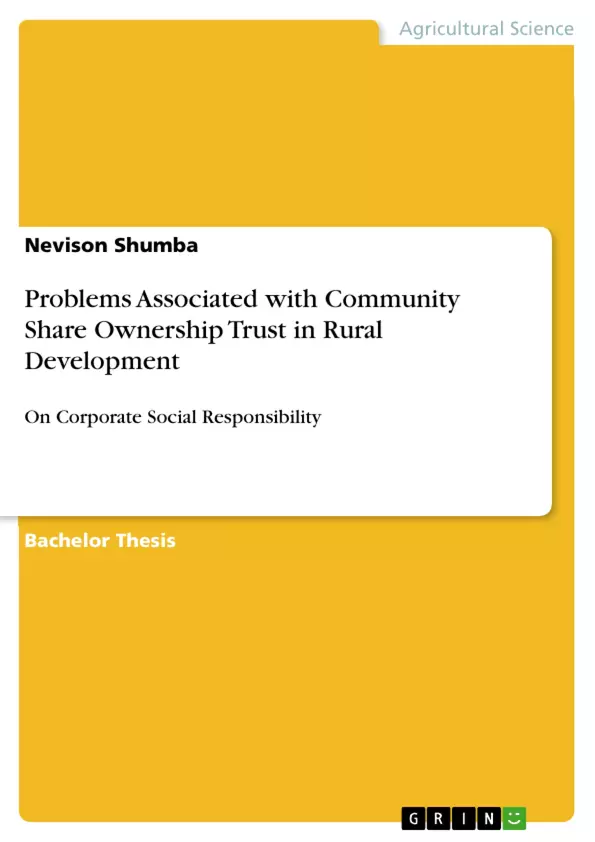This work focuses on the problems associated with community share ownership trust in rural development. It analyzes the aspect of corporate social responsibility in particular.
Community Share Ownership Trusts are increasingly becoming popular and popular as a means of community economic empowerment. However, there is very limited documented stock of knowledge on the frequency of their use, their validity in ensuring economic empowerment, structures and regulations governing their operation, or the factors that enable and constrain their effectiveness. The government of Zimbabwe recently introduced the Community Share Ownership Trust legitimized by the indigenization and Economic Empowerment Act of March 2010. The indigenization Act is a national policy which stipulates that the native citizens of Zimbabwe should be the majority shareholders of almost every business entity operating in Zimbabwe. The policy precisely states that 51% of the shares should belong to Zimbabweans with the community owning 10% of the 51%. Community Share Ownership Trust (CSOT) as an imaging rural development approach is proving to be effective. The approach has been implemented in countries like South Africa, India and others. It is a hybrid of Corporate Social Responsibility (CSR) which was coined in Europe in 1890s. Corporate social responsibility lacked legal force to enforce the corporate world to compensate the communities of the damage left during their operations. This led to the emergence of CSOT in developing countries.
While there are benefits attributed to the implementation of CSOT there are challenges that are also associated with it. The implementation of CSOT as a rural development approach is marred with a number of challenges which are both administrative and operational. It is constrained by funding, lack of managerial skills, limited community participation, poor communication, and lack of community sense of ownership among others. The strength of CSOT lies in the active participation of communities in development initiatives. CSOT promotes dialogue and community interaction, this is good for development as it brings social bond. It also promotes sustainable use of natural resources, management and protection. It encourages efficient and equitable distribution which is important for communities to participate in the economic mainstream. CSOT promotes economic empowerment, capacity building and community participation.
Inhaltsverzeichnis (Table of Contents)
- Abstract
- Introduction
- Background
- Statement of the Problem
- Justification
- Objectives
- Research Questions
- Scope of the Study
- Limitations of the Study
- Definition of Terms
- Literature Review
- Community Share Ownership Trusts (CSOT)
- Community Participation in Development
- Rural Development
- Indigenization and Economic Empowerment
- Challenges of CSOT Implementation
- Methodology
- Research Approach
- Research Design
- Population and Sampling
- Data Collection Methods
- Data Analysis Methods
- Presentation and Analysis of Data
- Socio-economic Characteristics of Mazvihwa Area
- CSOT Implementation in Mazvihwa Area
- Challenges of CSOT Implementation in Mazvihwa Area
- Benefits of CSOT Implementation in Mazvihwa Area
- Recommendations for Effective CSOT Implementation
- Conclusion
- Recommendations
- References
Zielsetzung und Themenschwerpunkte (Objectives and Key Themes)
This research aims to examine the problems associated with the implementation of Community Share Ownership Trusts (CSOT) in rural development, using the case of Mazvihwa area in Zvishavane, Zimbabwe. The study delves into the effectiveness of CSOT as a rural development strategy, analyzing both its benefits and the challenges encountered in its implementation.
- Community Participation in Development
- Rural Development Strategies
- Challenges of Community-Based Initiatives
- CSOT Implementation and its Impact
- Indigenization and Economic Empowerment
Zusammenfassung der Kapitel (Chapter Summaries)
The research begins with a comprehensive introduction, setting the context and outlining the study's objectives. It then delves into a thorough literature review, examining existing knowledge on CSOTs, community participation in development, rural development strategies, indigenization policies, and the challenges associated with CSOT implementation.
The methodology section explains the research approach, design, population and sampling techniques, data collection methods, and analysis techniques employed in the study.
The study then presents and analyzes data, exploring the socio-economic characteristics of Mazvihwa area, the implementation of CSOT in the region, and the challenges and benefits associated with its implementation. It concludes with recommendations for effective CSOT implementation, drawing upon the research findings.
Schlüsselwörter (Keywords)
The research focuses on the critical topics of Community Share Ownership Trusts (CSOT), rural development, community participation, indigenization and economic empowerment, challenges of CSOT implementation, and the case study of Mazvihwa area in Zvishavane, Zimbabwe. The study aims to contribute to the understanding of the complexities of community-based development initiatives and the role of CSOT in fostering sustainable economic growth and social well-being in rural areas.
Frequently Asked Questions about CSOT in Zimbabwe
What is a Community Share Ownership Trust (CSOT)?
It is a mechanism for community economic empowerment where local communities hold a share (often 10%) in businesses operating in their area, particularly in the mining sector.
What is the Indigenization and Economic Empowerment Act?
A Zimbabwean policy from 2010 stating that native citizens should be majority shareholders (51%) of businesses, with a portion dedicated to the local community.
What are the main challenges of CSOT implementation?
Key challenges include funding constraints, lack of managerial skills, limited community participation, and poor communication between stakeholders.
How does CSOT differ from Corporate Social Responsibility (CSR)?
While CSR is often voluntary, CSOT is a legally enforced hybrid that ensures communities are compensated for resources extracted from their land.
How does CSOT benefit rural development?
It promotes dialogue, sustainable use of natural resources, and capacity building, allowing communities to participate in the economic mainstream.
- Quote paper
- Nevison Shumba (Author), 2013, Problems Associated with Community Share Ownership Trust in Rural Development, Munich, GRIN Verlag, https://www.grin.com/document/496048



